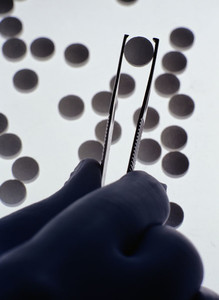By 2015, IMS Health expects spending on biosimilars to exceed US$2 billion annually, or about 1% of total global spending on biologicals [1]. This growth in biosimilars will be driven mainly by patent expiries coming in the next five years. However, due to the complexity and cost of developing biosimilars for western markets many biosimilar manufacturers are turning to emerging markets as being a much more cost-effective solution.
Between 2011 and 2015, a total of US$17 billion worth of sales in biologicals in the US alone will lose patent protection. Biologicals on the hit list include Roche’s blood cancer and rheumatoid arthritis medicine Rituxan (rituximab), Merck and J&J’s anti-inflammatory drug Remicade (infliximab) and Amgen and Pfizer’s rheumatoid arthritis drug Enbrel (etanercept). These three drugs alone are reported to have worldwide sales of more than US$5 billion annually [2].
The development and manufacture of a biosimilar molecule has been estimated to be US$50 to 100 million in developed countries [3]. Whereas in emerging markets, such as India, cost reductions of around 40% can be expected, making emerging markets very attractive destinations for biosimilars manufacture.
According to IMS Health, Brazil, China, India, Mexico, Russia, South Korea, Thailand and Turkey can be considered as emerging markets in pharmaceuticals or ‘pharmemerging’. More countries like Argentina, Venezuela and Vietnam were also added to this list in 2010.
According to figures from Insight Strategy Advisors, the yearly cost of treatment with a biological drug can be as much as US$40,000. Given the fact that annual earnings per capita in many emerging markets are only US$4,000–12,000, this puts most biological therapies out of the reach of the majority of the potential patient population. This means that biosimilars will have to be substantially cheaper than the originator biological in order to tap this potential market and government healthcare funding will be essential.
Funding for treatment with biologicals from healthcare schemes in these emerging markets can vary from 0% in Brazil up to 50–80% in Korea and Singapore.
Other emerging markets, such as Indonesia and Thailand, which have not yet financed these high-cost biological drugs may be willing to finance biosimilar versions if:
- The quality, safety and price of the product are acceptable.
- The molecule’s therapeutic area is identified as a priority by the competent authority.
There are clearly opportunities here for biosimilar drugmakers, both in cheaper manufacturing of biosimilars and a growing potential patient population.
Related articles
India’s top pharma company strengthens ties with South Africa
Hurdles to biosimilars in Asia
Cipla invests in biosimilars
References
1. GaBI Online - Generics and Biosimilars Initiative. Generics and biosimilars to drive down drug spending [www.gabionline.net]. Mol, Belgium: Pro Pharma Communications International; [cited 2011 September 09]. Available from: www.gabionline.net/Pharma-News/Generics-and-biosimilars-to-drive-down-drug-spending
2. GaBI Online - Generics and Biosimilars Initiative. Market opportunities for biosimilars [www.gabionline.net]. Mol, Belgium: Pro Pharma Communications International; [cited 2011 September 09]. Available from: www.gabionline.net/Biosimilars/General/Market-opportunities-for-biosimilars
3. GaBI Online - Generics and Biosimilars Initiative. Biotech growth and biosimilar opportunities in India [www.gabionline.net]. Mol, Belgium: Pro Pharma Communications International; [cited 2011 September 09]. Available from: www.gabionline.net/Biosimilars/General/Biotech-growth-and-biosimilar-opportunities-in-India








 0
0











Post your comment